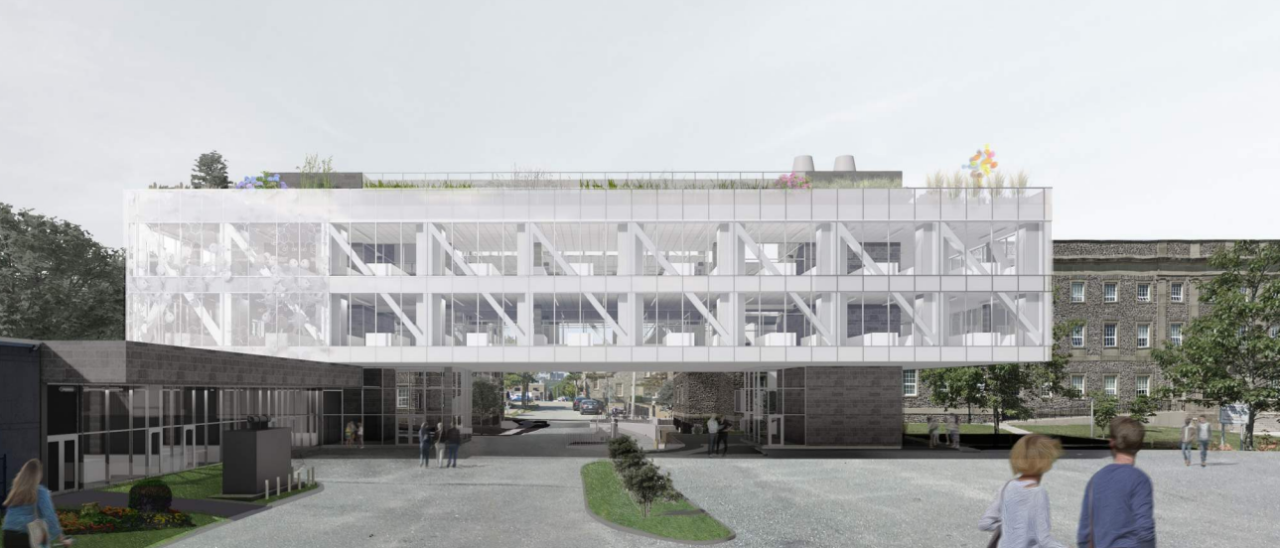 A rendering of what the Physical Sciences Centre facility could look like. The final design is subject to substantial change.
A rendering of what the Physical Sciences Centre facility could look like. The final design is subject to substantial change.
Posted: May 6, 2024
By: Kenneth Conrad
Originally published in Dal News
Dalhousie’s Studley Campus in Halifax has served as a hub for the study of the physical sciences for more than a century.
A new, modern facility being planned for the campus now promises to unlock even more potential for students and researchers in the fields of chemistry and physics and serve as a hub for cutting-edge solutions to help address climate change and other challenges facing Nova Scotia, Canada, and the world. Dalhousie is filing a request for proposals this week to design and build this state-of-the-art physical sciences facility.
“The Departments of Chemistry and Physics & Atmospheric Science are home to some of our most accomplished researchers,” says Dr. Charles Macdonald, dean of the Faculty of Science. “Whether they are established academics or rising stars in their fields, our researchers and the students learning from them deserve a first-class environment in which they can thrive and create the opportunities and solutions that will have an incredibly positive impact."
The Physical Sciences Facility for Green Energy Innovation will feature wet labs for researchers in the areas of advanced-energy storage, clean energy, and sustainable materials, with flexible research space that favours collaboration and the sharing of equipment.
“The new facility will be a hub for the kinds of chemical and materials research that enables advances in climate technology, allowing us to attract graduate students and accelerate solutions for a sustainable future,” adds Dr. Macdonald.
The Sir James Dunn and Chemistry buildings — Dal's existing physical sciences facilities — will remain open during construction of the new facility, which will be located nearby on a portion of what is now the Dunn parking lot.
A history of donor support
When the Chemistry Building opened at Dal in 1912 as the first facility on Studley Campus, it was called the Science Building and housed the departments of physics, chemistry, geology, and engineering. A Carnegie Corporation grant funded over half of the construction costs for the building.
The Sir James Dunn Building — named after its eponymous donor’s foundation — joined campus in 1960, giving physics a new home of its own.
In capitalizing on the momentum of Dal’s newly launched Bringing Worlds Together campaign, it is hoped that donor support will also help bring Studley Campus's newest building to life.
“Two of our core campaign themes are ‘inspiring future-ready leaders’ and ‘engaging in high-impact research,’” says Dr. Macdonald. “This new facility will provide a state-of-the-art learning environment for our current and future researchers working to solve some of the world’s most pressing problems. We welcome the opportunity to connect with donors wishing to support the project.”
While specifics of the facility's features will be determined during design and build, Dal is also aiming to incorporate increased energy efficiency and accessibility standards.
A progressive approach
Unlike many of Dal’s capital projects, in which facilities are designed and built by separate firms, this project will be guided by a more collaborative and stepped approach.
“This approach aims to see one company design and build the building in two primary phases,” says Craig Arthur, assistant vice-president (acting), Facilities Management. “In the first phase, the company we partner with will be working with us to design a world-class building that meets our institutional needs.”
It's an exciting time on campus with work slated to ramp up over the summer on the previously announced Oulton-Stanish Centre, a new events centre that will be home to Dal’s ice sports teams and the Dalhousie Physiotherapy Clinic. Previously announced projects like the Canadian Battery Innovation Centre planned for the Dunn Building remain on track. Housing also remains a key infrastructure focus as the university continues its efforts to bring more student housing online to better support the overall housing situation in our province. On this front, Dal’s Residence Office has added new beds to its existing inventory for this coming academic year. These additional beds will also ensure affordability is considered, as many of them will be double-occupancy units. Dalhousie is committed to additional housing and more information will be forthcoming as we continue our work in this area.